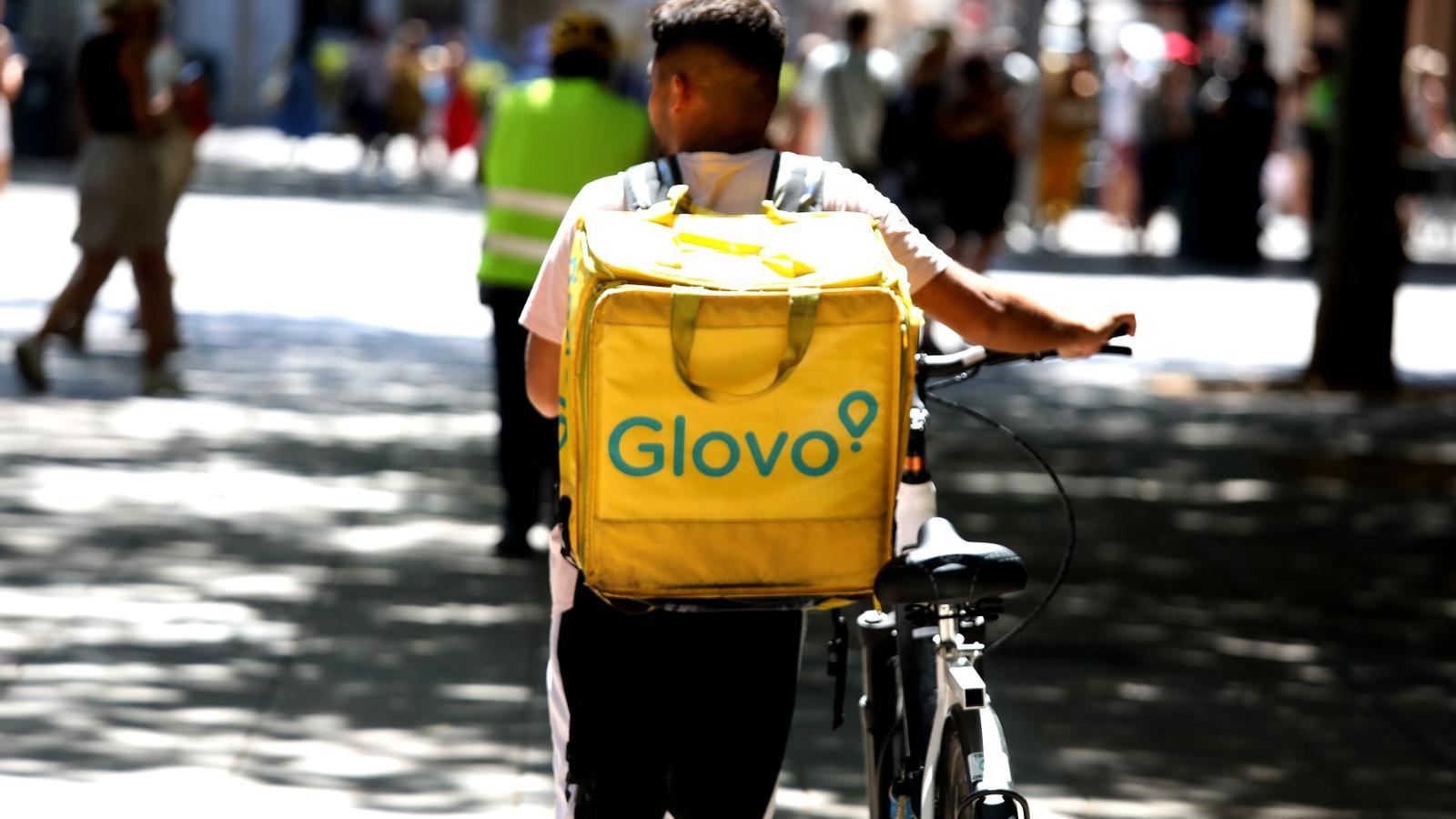The undocumented work of undocumented delivery drivers: "The bosses pay me in an envelope and keep part of my salary."
People in an irregular situation have found in courier services a way of subsisting that forces them to accept precarious working conditions.


PalmIt's Monday, and the day has had its ups and downs for Alex: he managed to find his local supermarket open—he normally gets home after it's closed—but he's barely earned 25 euros for almost twelve hours on the street delivering packages. "It's the slowest day of the week," he confirms. In the morning, he goes to a store in Palma where he sorts boxes, like any postman would.
When he decided to emigrate to Spain from Latin America, his acquaintances told him he could survive with that job. No one would ask for his papers. He'd earn a living without papers, but he'd need an electric bike to travel the distance. Suddenly, upon his arrival, he invested his savings: 1,400 euros.
Alex wears a Glovo helmet—the most famous food and product delivery platform—and places the packages in a Glovo suitcase. He gets paid in cash. "Yes, sir, in an envelope," he assures. The deal is one euro per package delivered. Last month, his detailed notes showed he had delivered 1,000 euros, but the envelope was missing 200 euros. "I don't deliver everything through an app. They keep records, just like I do, but when it comes to getting paid, you have to keep your head down because they tell you that if you don't like it, you should find another job. Or they directly remind you where you'll find it if you don't have papers," he explains. According to his account, he works with about 40 people delivering in the center of Palma along established routes. "The vast majority are Latin American, and we're all in an irregular situation," he asserts.
Sanction by the Spanish government
Delivering packages and food has become a means of subsistence for undocumented immigrants, exposed to precarious working conditions like those described by Álex. In fact, the Spanish government—through the Immigration Office—has imposed a fine of €847,640 on the multinational Glovo for employing 64 foreigners in Seville who lacked Spanish residence and work permits. The violation was detected during a labor inspection and is classified as "very serious" by the Immigration Law. ARA Baleares contacted Glovo to find out whether the parcel delivery drivers Álex was working for were employees of the company or part of a subcontractor to whom the service had been delegated. They neither confirmed nor denied this. They also did not provide the number of employees at the multinational or any information on the subsidiaries with which they operate on the islands.
"The problem with subcontractors is that you don't know how many there are. We don't know if there are ten or a hundred, and we have no way of finding out," admits Javier Pérez, union spokesperson for the General Confederation of Labor (CGT) at Glovo.
The multinational, supervised by the Spanish courts and government, promised to hire, starting July 1st, the so-called "riders", to put an end to a business model based on fake self-employment. In fact, a widespread practice until now has been the leasing of accounts that identified delivery drivers to people in an irregular situation who cannot work legally. Previously, they advertised them on social media. Now, it's more common to close the deal through someone's recommendation or intermediation. Alex claims to pay the account owner €350 per month and keeps the rest of the salary. Officially, the company's employment relationship is with the account holder. Some time ago, Glovo implemented a facial recognition system to ensure that the person working for the company was its owner, but it has since stopped doing so. "That control to prevent identity theft no longer exists. The company implemented it solely to cover its back with the Labor Inspectorate, so it could claim it had a surveillance system against the account-renting phenomenon, but there were ways around it. The owner logged in for the photo, logged out of the account, logged in whoever had it, logged in whoever had it. They closed rented accounts. They looked the other way. It suited them because legally self-employed delivery drivers didn't want to work under these conditions at the company.
Labor law expert José Manuel Raya agrees with the union's analysis. "Glovo has always operated in a very savage manner. They are aware of the situation. They have complete control, but they lose it because they don't want to exercise it. It's a sieve for the underground economy, and it's difficult to detect. Its business model is precariousness; a parcel delivery company that profits because it doesn't pay the wages of the sector." According to the expert, the law rider This forced the company to make adjustments because, before the Spanish government legislated to protect workers' rights, "it didn't have anyone under the general system." According to Raya, the strategy is to "continue adapting the business model" regardless of the lawsuits. "They fight them in court, but in the meantime, they continue making money. If they enter a legal system, it's not profitable. That's why I think they'll end up closing in Spain." The lawyer has no doubt that the workforce operates like contracted workers. "The orders, customers, prices, and means of production belong to Glovo. Therefore, they are employees. There is corporate control and management," he argues.
Edwyn delivers Glovo food on a scooter. He is in an irregular situation and arrived in Spain with the contact to rent an account from his native country. He pays the owner €400. The established salary is the minimum interprofessional wage, for at least 24 orders delivered per day. After that, he receives an extra €3 for each one. Between this and tips, he can earn 2,000 euros a month, after deducting the rent and half of the 700 euros he pays for a room he shares with his brother. "I manage the account even though it's not mine," he admits, as he puts on his helmet to deliver a fast-food order. "I assume everyone is making money from us, but anything is better than continuing to live in my country," he confesses.
Alex's numbers don't add up like Edwyn's. He doesn't receive tips from the packages. He has barely anything left, not just to live on, but to eat, after his employers take 20% of his earnings. "It's infuriating because I'm the one in the sun and rain, but we're aware that we're in another country illegally, and we have to keep quiet. They do whatever they want with us. They're looking for their own benefit, but since we're working illegally, we don't matter to them. No one's stopping me and eating, but I know that if I stop, there's no food left. I dehydrate and fill my bottle at public fountains, because the 80 cents it would cost me to buy one each day is a lot for me at the end of the month. You end up exhausted from tiredness and thinking about your life in delivered packages," he confesses. He has dinner when he gets home, and it's also the first time he's urinated since getting up. "I've asked bars to let me use the bathroom, and they've said no. I can't afford to consume anything either. So I have to wait," he adds.
From van to scooter
Sebastián worked for the government in his home country. He was imprisoned for three months for refusing to comply with an order affecting the safety of a minor. He decided to emigrate with his family. On his scooter, he carries a Glovo suitcase full of packages from AliExpress, the Chinese e-commerce giant. "I don't work for Glovo. I only bought it because it's very practical for the checkout," he reveals. His employers come every morning with a van and unload the items he needs to deliver. Edwyn has no papers, no contract, and no idea who he works for. The contact, as in so many other cases, came to him through an acquaintance. Like Álex, the payment is one euro per delivery. He has an assigned postal code and ends when all buyers receive their order. "Life is hard, but no worse than in my country. I have to feed my children, and no one will hire me. It's the only way to survive until I can apply for a residence permit. There's nothing left but to endure and thank God," she summarizes, before hopping on her scooter and meandering through the sun.
